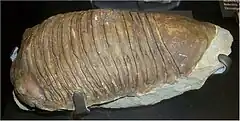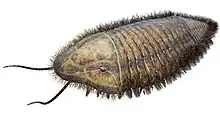Homalonotidae
Homalonotidae is a family of trilobites that lived from the Ordovician to the Devonian. They are characterised by a shovel-like cephalon (head), and are closely related to the family Calymenidae.[1]
| Homalonotidae Temporal range: | |
|---|---|
 | |
| Homalonotus | |
| Scientific classification | |
| Domain: | Eukaryota |
| Kingdom: | Animalia |
| Phylum: | Arthropoda |
| Class: | †Trilobita |
| Order: | †Phacopida |
| Suborder: | †Calymenina |
| Family: | †Homalonotidae Chapman, 1890 |
It contains the following genera:[2]
- Arduennella
- Brongniartella
- Burmeisterella
- Burmeisteria
- Digonus
- Dipleura
- Eohomalonotus
- Homalonotus
- Huemacaspis
- Iberocoryphe
- Kerfornella
- Leiostegina
- Parahomalonotus
- Plaesiacomia
- Platycoryphe
- Scabrella
- Trimerus
References
- Curtis R. Congreve & Bruce S. Lieberman (2008). "Phylogenetic and biogeographic analysis of Ordovician homalonotid trilobites" (PDF). The Open Paleontology Journal. 1: 24–32.
- S. M. Gon III. "Order Phacopida". Retrieved November 14, 2010.
This article is issued from Wikipedia. The text is licensed under Creative Commons - Attribution - Sharealike. Additional terms may apply for the media files.
